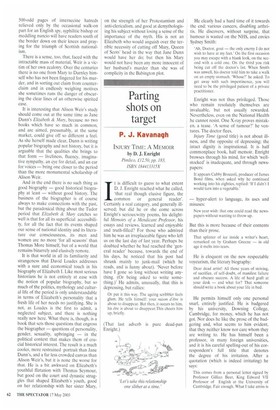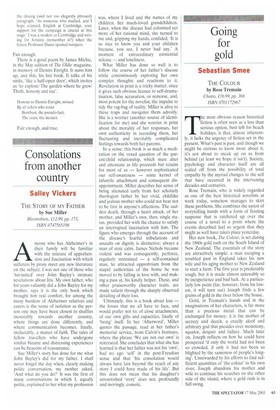Parting shots on target
P. J. Kavanagh
INJURY TIME: A MEMOIR by D. J. Enright Pimlico, ,£12.50, pp. 183, ISBN 184413315X 1 t is difficult to guess to what extent D. J. Enright reached what he called, 'that real though elusive figure, the common or general reader'. Certainly a real category, and generally illserved; but did he or she come across Enright's serious/witty poems, his delightful Memoirs of a Mendicant Professor, his essays and reviews, learned and enjoyable and truth-filled? For those who admired him he was an irreplaceable figure who left us on the last day of last year. Perhaps he doubted whether he had reached the 'general reader' because, towards the end of his days, he noticed that his post had shrunk mainly to junk-mail (which he reads, and is funny about). 'Never before have I gone so long without writing anything. (Or being asked to write something.)' He admits, unusually, that this is depressing, but rallies: Or put it this way. The ageing scribbler feels glum. He tells himself: your raison d'être is about to disappear. But then, it occurs to him, his etre is about to disappear.This cheers him up, briefly.
(That last adverb is pure dead-pan Enright.) He clearly had a hard time of it towards the end: various cancers, disabling arthritis. He discovers, without surprise, that humour is wasted on the NHS, and envies Sydney Smith:
`Ah, Doctor, gout — the only enemy I do not wish to have at my feet.' On the first occasion you may escape with a blank look, on the second with a cold one. On the third you risk being cut off the doctor's list. When Smith was unwell, his doctor told him to take a walk on an empty stomach. 'Whose?' he asked. To get away with such impertinence, you will need to be the privileged patient of a private practitioner.
Enright was not thus privileged. Those who remain resolutely themselves are invaluable, but not usually rewarded. Nevertheless, even on the National Health he cannot resist. One X-ray proves mistaken, a tease. 'A sense of tumour?' he ventures. The doctor flees.
Injury Time (good title) is not about illness, and the opposite of depressing; the intact dignity is inspirational. It is half commonplace book, half memoir. Enright browses through his mind, for which 'wellstocked' is inadequate, and through newspapers:
It appears Cubby Broccoli, producer of James Bond films, when asked why he continued working into his eighties, replied: 'If I didn't I would turn into a vegetable.'
— hyper-alert to language, its uses and misuses:
New year wish: that one could read the newspapers without wanting to throw up.
But this is more because of their contents than their prose.
That splinter of ice inside a writer's heart, remarked on by Graham Greene — in old age it melts into tears.
He is eloquent on the new respectable voyeurism, the literary biography:
Dear dead artist! All those years of striving, of sacrifice, of self-doubt, of manifest failure and obscure success. A life of hard graft at your desk — and what for? That someone should write a book about your life in bed.
He permits himself only one personal snarl, entirely justified. He is badgered by his university, Downing College, Cambridge, for money, which he has not got. Nor does he like the prose of the badgering and, what seems to him evident, that they neither know nor care whom they are writing to. He has himself been a professor, in many foreign universities, and it is his careful spelling-out of his correspondent's full title that denotes the degree of his irritation, After a quotation (which is indeed irritating) he says:
This comes from a personal letter signed by Professor Gillian Beer, King Edward VII Professor of English at the University of Cambridge. Fair enough. What I take amiss is
the closing (and not too elegantly phrased) paragraph. 'As someone who studied, and I hope enjoyed, English at Cambridge, your support for the campaign is crucial at this stage.' I was a student at Cambridge and writing for Scrutiny. (remember it?) when the future Professor Dame sported rompers.
Fair enough.
There is a good poem by James Michie, in the May edition of The Oldie magazine, in memory of Dennis Enright. It sums him up, and this, his last book. It talks of his smile, `like a half-open door', which invites us 'to explore/ The garden where he grew/ Thrift, honesty and rue'.
Honour to Dennis Enright, missed By all rebels who resist Bombast, the pseudo-fact, The crass, the inexact.
Fair enough, and true.



































































































 Previous page
Previous page